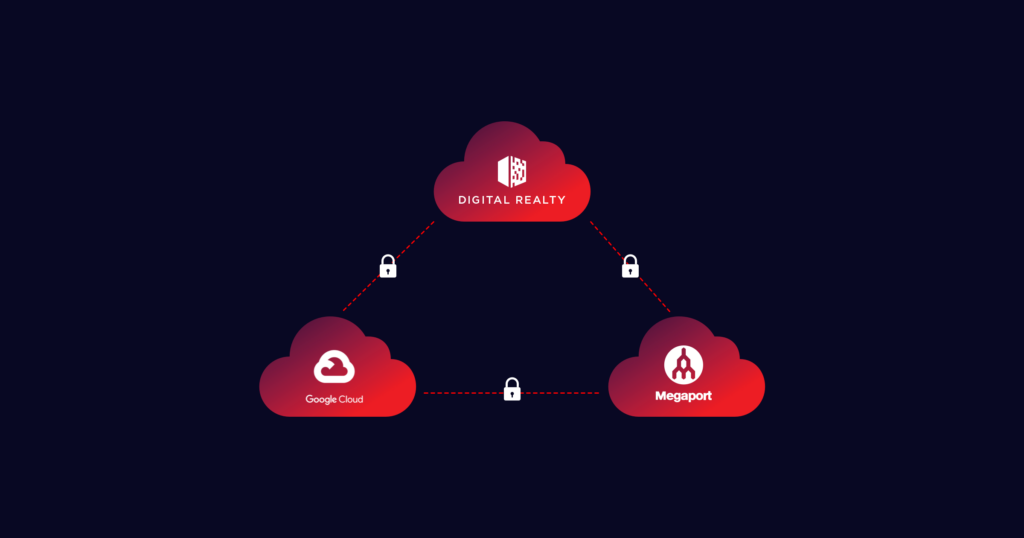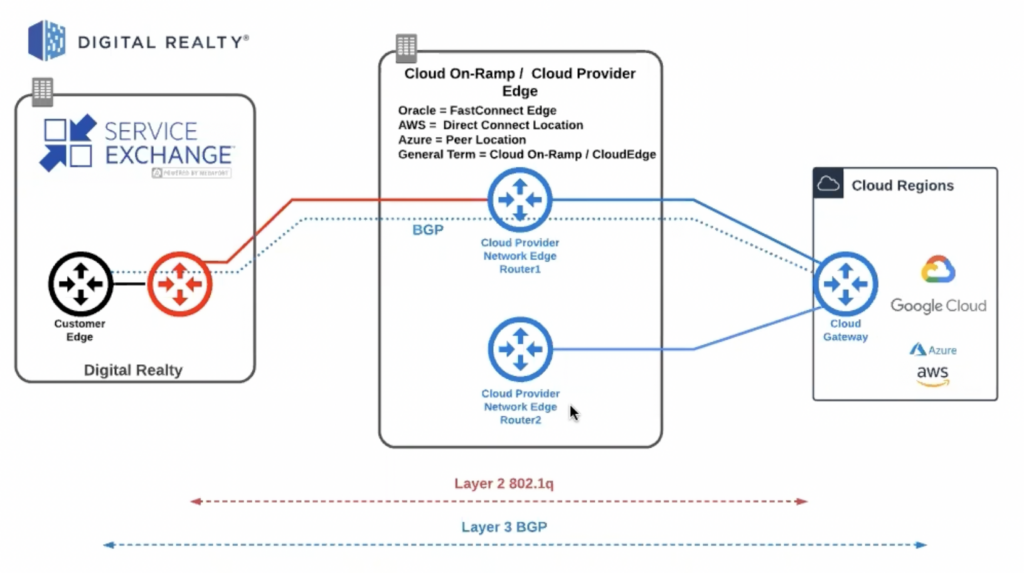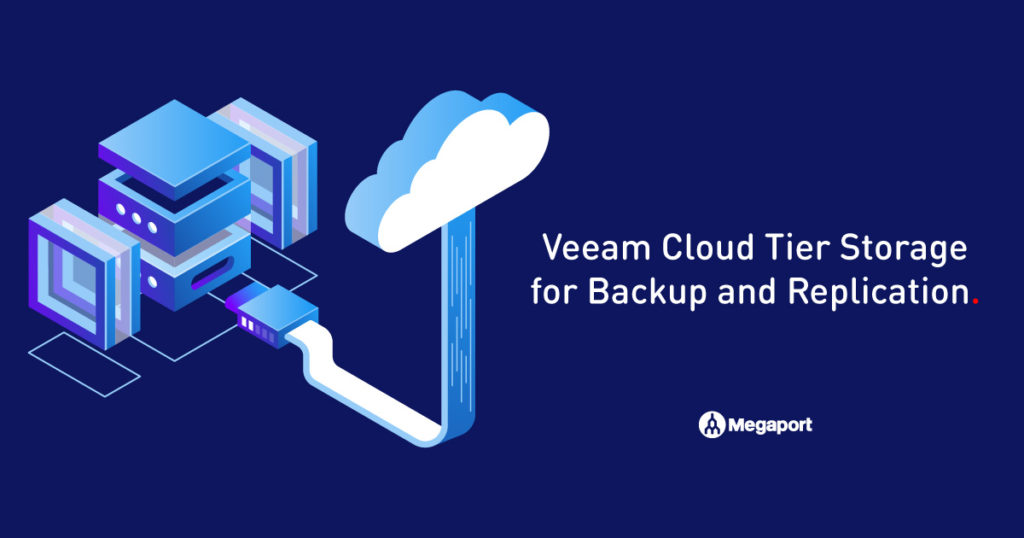
Digital Realty and Google Cloud Discuss Hybrid Cloud and Multicloud for Regulated Industries
- October 22, 2021
Architecting a hybrid cloud and multicloud strategy with data compliance regulations in mind isn’t easy. Luckily, we’re here to help.
In industries like banking, healthcare, and government, adhering to data compliance regulations isn’t just an arbitrary requirement; it’s essential to keep customer and company data secure.
In this recap of our recent webinar with long-time Megaport partners Digital Realty and Google Cloud , we look at the keys to building a successful hybrid cloud or multicloud architecture that doesn’t just comply with data regulations, but goes above and beyond to keep your business—and your customers’ data—as safe and secure as possible.
The problem: achieving compliance in a highly regulated industry
In many regions, like the European Union, the goalposts for compliance are moving constantly. But one factor stays consistent: data sovereignty, encryption, and privacy are a big deal to many countries, and to many companies.
When you consider your customers, business partners, providers, cloud service providers (CSPs), edge locations, and your mix of on-premises versus in-the-cloud information, knowing how to protect your entire business ecosystem and properly comply with regulations can be daunting.
Want to check the security of your data? We give you three questions you can ask in our blog.
When architecting a hybrid cloud or multicloud strategy, you want to get the right balance between security and agility, reliability and cost, and portability and consistency. Add to that the different software licenses to consider, and the work your infrastructure teams and application owners face is complex – and that’s before you even check your compliance requirements.
But when you leverage the right tools, you can manage all of these factors regarding compliance more easily than ever. Using Digital Realty as our data center example, Google Cloud (GCP) as our CSP example, and Megaport as our network underlay example, let’s review how you can build efficient, compliant hybrid cloud and multicloud network architectures for your enterprise.

The solution: private connectivity
Let’s say you want to use Google Partner Interconnect to extend your connectivity from an on-prem network workload through a highly available, low-latency connection, and imagine your on-prem physical equipment is located within a Digital Realty facility, either locally or via a cross connection from your physical on-prem environment – and you’re achieving this network connectivity across the map via Megaport.
To connect securely across GCP in a compliant way, you just need to create a single connection or pair of redundant connections to a region within GCP and from there, you can use its backbone to route traffic to other regions within GCP. But what about getting to GCP?
This is where Megaport’s Software Defined Network (SDN) comes in. To access any GCP availability zone or even edge location with Megaport, you have two options:
- You can deploy a Virtual Cross Connect (VXC) to access that zone if you’re physically located in a data center that has an on-ramp or edge location with GCP.
- If you’re not physically located in a GCP-connected data center, you can use Megaport Virtual Edge (MVE) to securely and remotely reach a GCP edge location and access their platform.
If you’re located in a Digital Realty data center, you can use Digital Realty Service Exchange (SX), a Megaport-integrated network fabric, to globally connect your IT workflows securely to and between GCP’s (or any other CSPs) connection points.
These secure layers take your data on a private route, via a private fabric, between secure destinations, so you can focus on customizing your hybrid cloud or multicloud setup while knowing your compliance requirements are automatically being catered to.
How to connect Service Exchange and Megaport
To get started connecting SX and Megaport, you can easily go into either your Megaport or your SX console and deploy a 1G, 10G, or potentially even a 100G physical connection into the network.
You’re then going to set up a 802.1Q trunk port, and assign a VLAN on what we call a Virtual Cross Connect (VXC) or a cross connect with SX. We’re then going to provide the private connectivity to the appropriate zone on the GCP network.
Then, you can use your Partner Interconnect attachment to connect to your cloud router. In this particular situation, you have full control over your routing between your on-prem network that’s going to appear directly with your virtual private cloud or GCP network.
Get a comprehensive guide to multicloud with Google Cloud Platform here.
Benefits of connecting to Google Cloud with Service Exchange via Megaport
Number of on-ramps
When you use SX via Megaport, you can take advantage of the fact that Megaport has more cloud on-ramps than anyone globally. Whether you’re connecting to GCP or another provider like AWS or Azure, if you’re using that SX fabric, you’ll have access to multiple on-ramp locations that will sit in those major markets. This means you can access the cloud provider network on a short path for low latency, but also connect through the cloud provider directly to the region sitting closest to your data center.
Supports stronger multicloud
With our expansive global footprint, it’s easy to have a multicloud approach as long as you have a single connection point in a Digital Realty data center, as you can connect from a Digital Realty data center through SX to any Partner Interconnect endpoint with Megaport. Just set up a Megaport Cloud Router (MCR) , which can also be set up to other cloud providers, allowing seamless multicloud connectivity between your different workloads.
MCR is on-demand with no lock-in contract, and manages the peering relationships with each of its endpoints so you can route cloud to cloud , and also back into the data center. MCR also supports latency and optimized application support across any geographical distance. MCR is automated in setting up layer 2 connectivity between Megaport and GCP, but it also sets up the peering relationship as well.
Did you know MCR also has route filtering? Learn more about it here.
99.99% Service Level Agreement (SLA)
Because Megaport has already built out the physical infrastructure to support redundant connectivity at the edge of Google’s network across 24 countries, you benefit from a more reliable SLA and a more redundant network.
Simplified network management
Customers can simply connect from the SX fabric or Digital Realty data center to the platform, and can build Partner Interconnects into Google. You can seamlessly manage all of these environments and build out the private connectivity and resources needed on each end to support your enterprise.
Plus, when you use Megaport’s SDN, you’ll unlock a lot more benefits than just strong security:
- Low latency connections: Whether you go via a data center, Digital Realty’s SX, or from a CSP edge location via MVE, Megaport’s connectivity layer is designed to move your workloads quickly and reliably.
- More reliable connectivity: By moving our traffic off of a public internet or a VPN tunnel, and onto a private network fabric like Megaport’s, you can find assurance in our highly redundant network, no matter how complex your hybrid cloud or multicloud architecture needs to be.
- Lower costs: With scalable, on-demand connectivity, you can forget about costly long-term contracts that require you to pay for your highest-bandwidth scenario at all times. Dial up and down in a few clicks via Megaport’s portal, and only pay for what you use. Plus, by moving your workloads off the public internet and VPN tunnels, you’ll avoid additional egress charges.
This blog post is a recap of our webinar “Modernized Business Operations for Regulated Environments .” Thank you to the presenters:
Don Atwood, Senior Solution Architect, Digital Realty
John Bacon, Partner Engineer, Google Cloud
Nick de Cristofaro, Networking Specialist Customer Engineer, Google Cloud
Mike Rockwell, Global Head of Solutions Architects - Direct Sales, Megaport


